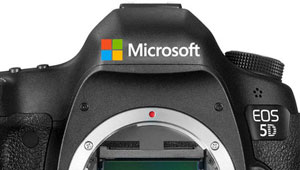You’ve probably heard it, Microsoft and Canon signed a patent cross-licensing agreement. According to the Microsoft presser the deal furthers collaboration on research and development. Teaming up gives each company access to the other’s patents portfolios, which include a range of products and services such as certain digital imaging and mobile consumer products. So are we getting… better cameras?!
The collaborative approach allows both companies to deliver inventive technologies that should benefit consumers around the world. Nevertheless, both the partners are hush-hush about the deal, leaving everything from the financial terms to the scope of such a deal to speculation — and hope for that.

It’s not known what patents are changing hands. All we know is the agreement covers a “broad range of products and services each company offers, including certain digital imaging and mobile consumer products.”
One guess is that rather Microsoft than Canon is on the receiving end. One area that could benefit the most is PureView technology and its integration in Microsoft’s future smartphone lineup.
Or we could get a Canon smart camera à la Galaxy running on Windows. Or RAW and better image editor for Windows phones…
Or we could see a whole new hardware and software integration with Windows churning out more state of the art digital imaging processing solutions and getting access to superior sensor technologies while an integration into the massive Windows apparatus could benefit Canon on many fronts. Microsoft avoids having to invest huge sums in R&D efforts and Canon could give the Redmond company an edge against the vast army of camera phones.
Overall it looks like a better deal for Microsoft. It’s not exactly clear how Canon is likely to benefit from the deal that largely has mobile and software patents involved. The Japanese company could offer lighter cameras without compromising on quality and also enhance its compatibility between printers and enterprise-oriented software developed by Microsoft.
Or we’re talking next generation. More elaborate data processing, more sophisticated convergence devices and more power to the cloud, that’s the future. The merging of everything into one device. To this effect both players could now be positioned a bit better, enjoying a certain edge over Apple a.k.a. Nikon and the rest.


